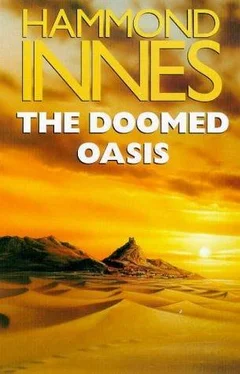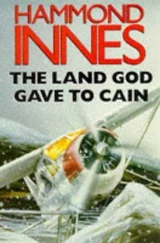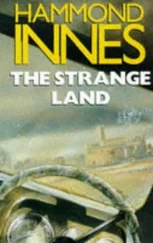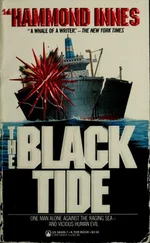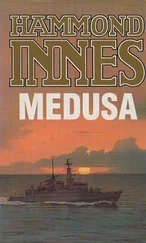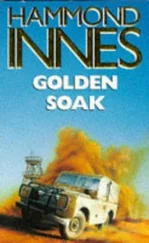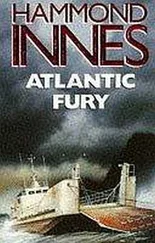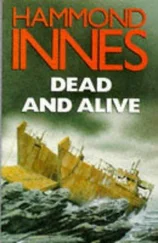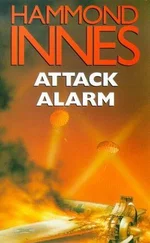Hammond Innes - The Doomed Oasis
Здесь есть возможность читать онлайн «Hammond Innes - The Doomed Oasis» весь текст электронной книги совершенно бесплатно (целиком полную версию без сокращений). В некоторых случаях можно слушать аудио, скачать через торрент в формате fb2 и присутствует краткое содержание. Жанр: Прочие приключения, на английском языке. Описание произведения, (предисловие) а так же отзывы посетителей доступны на портале библиотеки ЛибКат.
- Название:The Doomed Oasis
- Автор:
- Жанр:
- Год:неизвестен
- ISBN:нет данных
- Рейтинг книги:5 / 5. Голосов: 2
-
Избранное:Добавить в избранное
- Отзывы:
-
Ваша оценка:
- 100
- 1
- 2
- 3
- 4
- 5
The Doomed Oasis: краткое содержание, описание и аннотация
Предлагаем к чтению аннотацию, описание, краткое содержание или предисловие (зависит от того, что написал сам автор книги «The Doomed Oasis»). Если вы не нашли необходимую информацию о книге — напишите в комментариях, мы постараемся отыскать её.
The Doomed Oasis — читать онлайн бесплатно полную книгу (весь текст) целиком
Ниже представлен текст книги, разбитый по страницам. Система сохранения места последней прочитанной страницы, позволяет с удобством читать онлайн бесплатно книгу «The Doomed Oasis», без необходимости каждый раз заново искать на чём Вы остановились. Поставьте закладку, и сможете в любой момент перейти на страницу, на которой закончили чтение.
Интервал:
Закладка:
‘What’s Colonel Whitaker got to do with it?’ I asked.
‘He is drilling an oil well in Saraifa. Oh,’ she said angrily, ‘the greed of you men. Money, money, money — you think of nothing else and you must cut each other’s throats to get more and more. But with David it is different. He don’ want money. He want something … I don’ know. I don’ know what he want. But not money. He don’ care about money.’
It was extraordinary; this girl telling me what Colonel Whitaker was doing, confirming what I had already guessed. ‘How do you know Colonel Whitaker is drilling for oil?’ I asked.
‘How? I tell you, this place is for oilmen. They ‘ave their intelligence and because they are ‘omesick and half dead with ennui, they talk.’ She gave a little laugh. There is so much talk in this ‘ouse that I can almost tell you what each oilman eat for breakfast from Doha right down the Gulf to Ras al-Khaima.’
I sat for a moment thinking about the rumours she’d heard, remembering what Ruffini had said out there on the Jufair jetty.
‘You will tell him what I say. You will warn him?’
‘Of course.’ What else could I say?
‘Do you go to Saraifa? If you go there, pleez you should talk with Khalid. He is the sheikh’s eldest son. He and David hunted together when he is first in the desert. They are like brothers he always say.’
I gave a little shrug. How would Khalid know? How would anybody know what had happened? The boy was dead. ‘I’ll see his father,’ I said. ‘If I can.’
‘Non, non. ‘ There was urgency, a sense almost of fear in her voice.
I stared at her hard. ‘Why not?’ But if she knew anything, she wasn’t saying. And because I didn’t like the way my thoughts were running, I asked her where David had been going that last time she had seen him.
‘To Dubhai,’ she answered. ‘By ship.’
The Emerald Isle?’ She nodded.
‘And after that — after Dubhai?’
Again that slight, impatient movement of the shoulders.
‘He don’ say. He don’ tell me where he go.’
‘Was it Safaira?’
‘Perhaps. I don’ know.’
There’s some suggestion that he was on loan to his father, that he was doing a survey for Colonel-’
‘Non, non.’ Again the urgency, the leap of something stark in the wide dark eyes. ‘C’est impossible.’ She shook her head emphatically.
‘Why is it impossible?’
‘Because-’ She shook her head again. ‘He cannot go to work with him. I know that now.’ And she added under her breath: ‘Que le bon Dieu le protege!’ I felt I had to know the reason, but when I pressed her for it, she shied away from the subject. ‘I must go now.’ She got to her feet in one easy, balanced motion. It was as though my questions had started an ugly train of thought — as though to admit that he’d gone to Saraifa to join his father was to admit the fact of his death. And as I stood up I was remembering again the nagging suspicion that had been in my mind that day Griffiths had come to see me in Cardiff.
‘Au revoir.’ She held out her hand and I was conscious again of the steel grip of those thin fingers. ‘You are his friend. I know that now. And when you find him you will warn him?’ I nodded, not saying anything. ‘And you can give him my love also,’ she said with a sudden flash of gaiety. And then serious again: ‘The boy Akhmed will be waiting each morning for you at the ‘otel. I have arranged it. He knows many people and he can help you if you wish. And remember please,’ she added, ‘this is an island very close to the great deserts of Arabia — much closer than Algerie is to the Sahara. And the desert is Arab. Your Eenglish officials and the oilmen, they know only what ‘appen on the surface. They can see the bees swarm, but they do not know when the old queen die. You understand?’ And with that she pulled back the bead curtain and I was out in the passage again where the dance music sounded faintly. She took me as far as the alleyway where the boy was waiting and then with a final touch of those fingers, a flash of white teeth, she was gone.
It was only after I was back in the car that I realized I didn’t know her name. I got it from the boy — Tessa; a very European name for a girl of her mixed parentage. Later I learned that it was a shortened form of Tebessa, the town on the Algerian-Tunisian border where she had been born. I lay awake a long time that night wondering about David, about what had really happened. Three women — his mother, his sister, and now this girl Tessa — all convinced he was alive. And the picture she had sketched of him, the warning of trouble brewing. I went to sleep with the unpleasant feeling that I was being caught up in the march of events. And in the morning Mahommed Ali drove me to the airport.
3. The Empty Quarter
We took off shortly after ten, skimming low over sand flats that ran out into the shallows where fish stakes stood in broad arrows. The white coral buildings of Muharraq vanished behind us and after that the waters of the Gulf stretched away on either side, a flat sea mirror shimmering in the heat, and the colours were all pastel shades.
The plane was piloted by the Canadian I had swum with the previous day — Otto Smith. He had joined me on the apron just before take-off and realizing that I’d never seen what he called ‘this Godforsaken country’ before, he had offered to make it a low-level flight. We flew, in fact, at less than a thousand feet. A white-winged dhow swam like a child’s toy on the sheet steel surface below, and where the water shallowed to islands banked with sand it was translucent green, the sand banks sugar white.
We crossed the Qattar Peninsula; a glimpse of an oil camp, the airstrip marked out with oil drums, the camp a wheel of concentric buildings and the rig a single lonely tower. A sheikh’s palace standing on an empty beach, square like a military fort, the mud of its walls barely discernible against desert sand. The palm frond shacks of a barasti fishing village, and then the sea again, until the white of gypsum appeared on the starboard side and miniature buttes of sand standing out of the water marked the mainland coast of Arabia.
The plane was full of equipment and stores bound for an oil camp along the coast towards Ras al-Khaima, beyond Sharjah. There were only three passengers besides myself — an officer of the Trucial Oman Scouts and two oilmen who were straight out from England and could tell me nothing. I sat in silence, in a mood of strange elation, for the sight of the desert so close below the plane gave me the illusion at least that Saraifa was within my reach.
We followed the coast all the way. Shallow sand dunes replaced the glare of gypsum flats, the coast became dotted with palms and here and there a pattern of nets spread out on the shore to dry marked a fishing village. About an hour and a half out Otto Smith called me for’ard to look at Dubai. The Venice of Arabia,’ he shouted to me above the roar of the engines. A broad estuary dog-legged through the sandbanks, dwindling amongst the town’s buildings which crowded down to the waterfront, capped by innumerable towers, slender like campanili — the wind towers that Tessa had talked of, a simple system of air-conditioning brought from Persia by the pirates and smugglers of the past.
Ten minutes later we reached Sharjah; another estuary, but smaller and with a sand bar across the entrance, and the mud town crumbling to ruin. We came in low over a camel train headed south into the desert, the glint of silver on guns, the flash of white teeth in dark faces, and a woman, black like a crow, with a black mask covering her face, riding the last camel. Watch towers stood lone sentinels against the dunes, and far away to the east and south-east the mountains of the Jebel were a hazy, dust-red wall. We came to rest close by the white glare of the Fort, and behind it lay the camp of the Trucial Oman Scouts.
Читать дальшеИнтервал:
Закладка:
Похожие книги на «The Doomed Oasis»
Представляем Вашему вниманию похожие книги на «The Doomed Oasis» списком для выбора. Мы отобрали схожую по названию и смыслу литературу в надежде предоставить читателям больше вариантов отыскать новые, интересные, ещё непрочитанные произведения.
Обсуждение, отзывы о книге «The Doomed Oasis» и просто собственные мнения читателей. Оставьте ваши комментарии, напишите, что Вы думаете о произведении, его смысле или главных героях. Укажите что конкретно понравилось, а что нет, и почему Вы так считаете.
